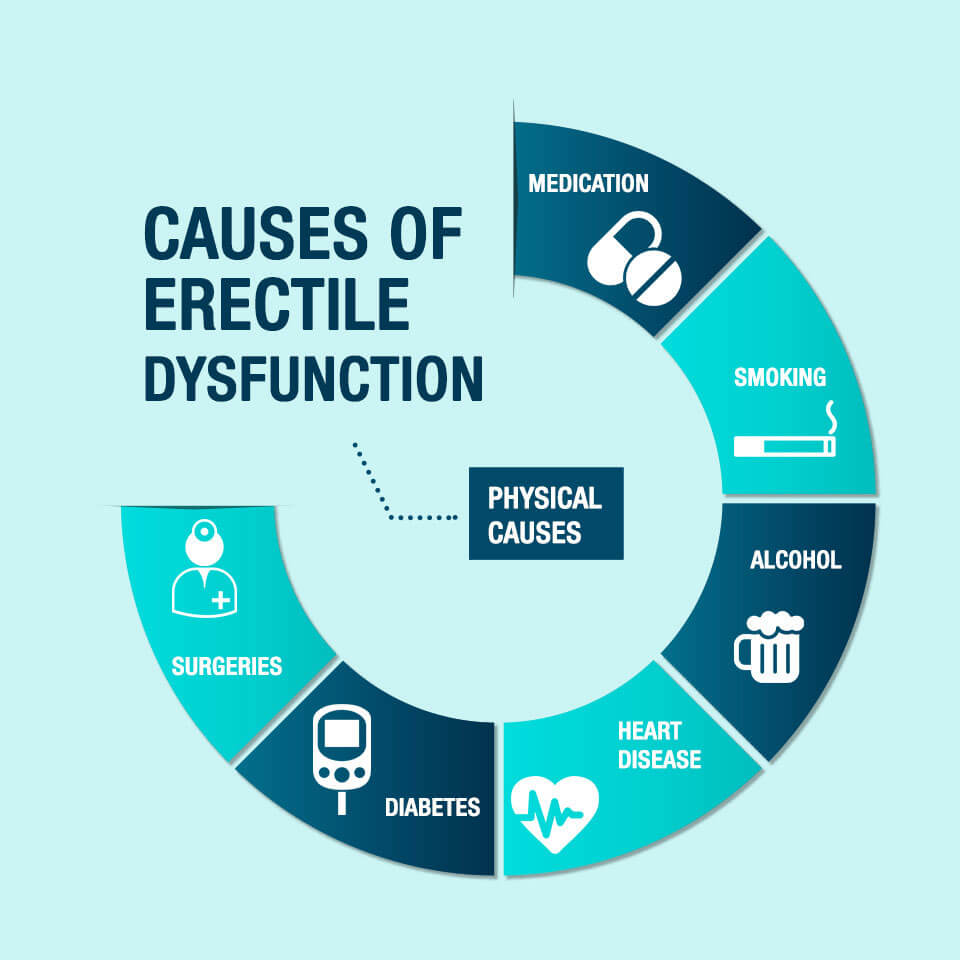What are the links between Heart disease and ED?
What is Erectile dysfunction?
Erectile dysfunction is basically a disorder found in men which could be a sign of physical or psychological condition. The symptoms associated with this disorder is found in men’s reproductive organ i.e. inability to keep an erection firmer and longer enough during a sexual activity.
There are many men who experience erectile dysfunction occasionally because of stress, fatigue, alcohol, or emotional issues, but 25% of men have recurring episodes of the disorder. People dealing with erectile dysfunction will be:
- Unable to achieve erection at anytime needed.
- might achieve erection sometime but not when needed like during sexual activity.
- might able to achieve erection when needed but not long enough
Causes of Erectile dysfunction
Following are multiple reasons due to which an individual man may experience erectile dysfunction.
- Diabetes, especially uncontrolled type 2 diabetes
- Certain Heart Diseases
- High blood pressure
- Atherosclerosis (hardening of the walls of the arteries)
- Chronic kidney disease (CKD)
- Fatigue
- Drug abuse
- Excessive alcohol or tobacco consumption
- Certain medications (antidepressants, blood pressure medications, sedatives, appetite suppressants, or medications to treat prostate cancer)
- Surgeries on the bladder or prostate
- Lack of physical activity
- Obesity, etc.
How Serious is ED?
It is estimated that one out of ten adult males suffer from erectile dysfunction. Having trouble achieving an erection is a much more common problem faced by most men at some point in their lives. An individual can experience occasional failure for a variety of reasons, such as excessive alcohol consumption or extreme fatigue.
There is no reason to worry if you do not achieve an erection less than 20 percent of the time, and treatment is rarely required. The tendency to fail more than 50 percent of the time indicates that there is a psychological or physical problem (or a combination of both) requiring treatment.
How are erectile dysfunction and heart problems linked?
There is a very strong correlation between erectile dysfunction and heart disease. Many studies have shown that men with ED have a higher risk o developing heart disease. According to one study, 57% of men who had bypass surgery and 64% of men hospitalized for heart attacks had the condition at least once.

It is predicted that men with ED will develop heart disease symptoms within five years of developing the condition. The presence of ED is just as significant a risk factor for heart disease as smoking or having a family history of coronary artery disease.
It was believed that erectile dysfunction often preceded heart problems due to plaques accumulating in the arteries of the body (atherosclerosis). According to the theory, plaque buildup in the penis reduces blood flow, making it hard to erection.
Today, experts say erectile dysfunction is more often caused by damage to the endothelium and smooth muscle inside the blood vessels than it is by heart disease itself. When the endothelium is dysfunctional, the heart receives inadequate blood supply, and the penis receives impaired blood flow, which contributes to atherosclerosis.
Strength of link between ED and heart disease
The presence of erectile dysfunction does not always indicate the presence of a heart condition. In contrast, research suggests that men with erectile dysfunction who have no obvious cause (such as trauma) and no symptoms of heart disease should be screened for heart disease before starting any treatment.
Treatment Options
Your doctor may recommend lifestyle changes if you are at risk for heart disease. It is important to make lifestyle changes that improve heart health and penis health at the same time. Get more physical activity, maintain a healthy weight, stop smoking, and drink alcohol only in moderation. In the event of more serious signs and symptoms of heart disease, further tests or treatments might be necessary.
You should discuss treatment options with your doctor if you have both erectile dysfunction and heart disease. There are some medications used for treating erectile dysfunction that are not safe to use if you take certain heart medications, especially nitrates.
Conclusion
It is very common for men to experience erectile dysfunction as they age. Atherosclerosis, a condition in which blood vessels become clogged or narrowed, often causes erectile dysfunction. The diagnosis of erectile dysfunction usually happens three to five years before a heart attack, so treating atherosclerosis and preventing a heart attack is possible after ED is diagnosed. Atherosclerosis can be treated with diet, exercise, and medications, if necessary. Consult your doctor if you have a broken sex life, and you might be able to prevent a broken heart.
REFERENCES:
- https://www.mayoclinic.org/diseases-conditions/erectile-dysfunction/in-depth/erectile-dysfunction/art-20045141
- https://my.clevelandclinic.org/health/diseases/15029-heart-disease–erectile-dysfunction
- https://www.ncbi.nlm.nih.gov/pmc/articles/PMC4442980/
- https://www.ahajournals.org/doi/full/10.1161/CIRCULATIONAHA.110.017681
- https://www.health.harvard.edu/blog/erectile-dysfunction-often-a-warning-sign-of-heart-disease-201111032504
For more details, kindly visit below.
